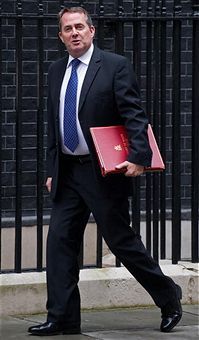 Most people probably greeted Liam Fox sacking of Sir Bill Jeffrey, alongside that of the
Chief of Defence Staff in that Sunday Times interview with one word – who? The department’s Permanent Under-Secretary –- or PUS — is a pretty unassuming figure especially sat next to
the be-medalled soldiers he works with. Few people outside of Whitehall knew who he was before his defenestration; few will remember his name even today.
Most people probably greeted Liam Fox sacking of Sir Bill Jeffrey, alongside that of the
Chief of Defence Staff in that Sunday Times interview with one word – who? The department’s Permanent Under-Secretary –- or PUS — is a pretty unassuming figure especially sat next to
the be-medalled soldiers he works with. Few people outside of Whitehall knew who he was before his defenestration; few will remember his name even today.
But there is more at work here than one man’s professional demeanor. Britons, despite being reared on the power of officials by TV shows like “Yes Minister”, do not know and do not care about anonymous power-brokers such as Sir Bill.
Only when a scandal grows out of all proportion do they become known. But until then, the media, politicians and officials cooperate in a conspiracy of silence, which aims at exaggerating the role of ministers. Opposition politicians do so to convince voters they can make a real difference if they are elected. Ministers do so in order to show that they are in charge. Officials in turn minimise their role and exaggerate that of ministers to get away with their chosen course of action – and avoid blame. Finally the media aid the conspiracy because most officials are –- sorry chaps — too boring to write about.
Yet the role of officials cannot be exaggerated. It is hard to imagine someone like the former Ministry of Defence PUS Sir Kevin Tebbit allowing the department to overspend quite as much as it has since he left the four years ago. Officials, even the most senior ones, are also not above spinning and briefing against ministers. The Ben Brogan story recently had a few mandarin-looking footprints on it.
The future choice of Permanent Under-Secretary in the Ministry of Defence is therefore just as important as the choice of Defence Chief. Gossip has it that Liam Fox wanted Mark Sedwell in the job, but was dissuaded from appointing the NATO diplomat. Now three internal candidates are thought to be in the running for the job: Jon Day, Tom McKane, and Ursula Brennan. There will also be one outside candidate who is hoping to return to the department: Margaret Aldred, who now works on the Iraqi Inquiry.
But the person who may best serve the Defence Secretary’s ambition of turning his department around, who can balance a powerful Defence Chief and who can help in the crucial task of re-building trust between No 10 and the Ministry of Defence, may be someone else entirely: Jeremy Heywood, the Principal Private Secretary to the Prime Minister.
Heywood knows numbers from his time in the Treasury under Norman Lamont, Kenneth Clarke and Gordon Brown before he moved on to be Tony Blair’s aide in 1999. In 2003 he left the Civil Service to work in banking only to return to No 10 where he still works. More than any of the internal candidates, a man like Heywood may be exactly what Fox needs to reform British Defence and make a success of the MoD, post-Security and Defence Review.






Comments